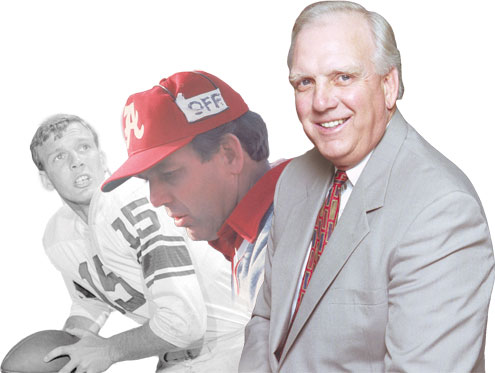 Down the hall from a legendary bronze statue, in an athletic facility that boasts more champions than any other program in college football, works a flesh-and-bone figurehead of University sports.
Down the hall from a legendary bronze statue, in an athletic facility that boasts more champions than any other program in college football, works a flesh-and-bone figurehead of University sports.
Athletic Director Mal Moore’s past three months are too significant to ignore: He was selected in November for inclusion in the Alabama Sports Hall of Fame’s 2012 inductee class, and in January, the Crimson Tide won the 2011 BCS National Championship.
“What a great year for Alabama football, with all the success we’ve enjoyed,” Moore said. “I’m really proud of the way our players and coaches responded to the loss during the season and came back to win big in the championship game.”
In light of his recent selection to the Hall of Fame, a club in which he and the seven other members of the 2012 class will enlist following the formal induction ceremony in May, Moore remained gracious and grateful.
“The Hall of Fame called me up in November to let me know I had been chosen. What a very high honor for anyone,” he said. “I’m proud and appreciative for the University and all of the people that have helped me out a lot in getting to where I am and we are today.”
Moore counts Coach Paul “Bear” Bryant, whom he played for and coached under for 23 years, among those helpers.
“I was very fortunate to coach with [Bryant] for 19 years. Everyone that played for or worked with him was affected in a positive way,” he said. “Whenever I’m presented with issues, I think about how he would have handled situations, and I draw from that every day.”
Since first stepping foot on campus in 1958, Moore has spent most of his career at the University, leaving only for a few brief stints with Montana State, Notre Dame and the NFL’s Arizona Cardinals.
During his tenure as UA’s athletic director, which began in 1999, the school’s athletic squads have won four national championships – football in 2009 and 2011 and gymnastics in 2002 and 2011.
Decades of experience present substantial potential to make an impact, an opportunity of which Moore has taken full advantage.
“What’s so special about Coach Moore is his leadership with students in making the importance on educational success,” said Deputy Athletic Director Shane Lyons. “He emphasizes success on the field but, more importantly, success in the classroom as well, and that has meant a better experience for our student athletes.”
Lyons also cited Moore’s tenure as a significant factor in his decision to come work at the University.
“The chance to be here during his time as athletic director is a great opportunity – one I couldn’t pass up,” he said.
Major Ogilvie, who played for the Crimson Tide from 1977 to 1980, during Moore’s time as offensive coordinator, feels the true extent of the director’s impact is most accurately examined through his dedication to those around him.
“Any time you talk about Coach Moore, you have to talk about a great person who works hard and is committed to his players and the University,” Ogilvie said. “I can’t think of many folks that would be a better mentor to have down here with student athletes.”
Moore made it clear he hopes to stay “down here” and impact lives for many years to come.
“It’s rewarding to know you’re helping young people realize their potential. I enjoy what I’m doing,” he said. “I never dreamed I’d be in this office. Now, I don’t know what I would be doing if I wasn’t here.”









